Former president Cristina Fernández de Kirchner, already serving a six-year sentence for fraud under house arrest, went on trial on Thursday in what prosecutors describe as the largest corruption case in Argentina’s history.
A dominant and polarising figure in national politics for over two decades, Fernández de Kirchner led Argentina between 2007 and 2015. She now stands accused of heading an illicit association and co-authoring acts of passive bribery, allegedly involving hundreds of payments from businesspeople seeking public works contracts during her administration.
The proceedings are being heard by Federal Oral Court No. 7 (TOF 7), presided over by Judge Enrique Méndez Signori, alongside Judges Germán Castelli and Fernando Canero also on the bench. Hearings are taking place remotely, reportedly due to the lack of a big enough courtroom, and are being streamed on the Judiciary’s YouTube channel.
A total of 87 defendants are in the dock, most of them former government officials and business leaders. Among them are former Federal Planning Ministry officials Julio De Vido and Roberto Baratta, as well as dozens of construction and energy executives, some of whom have admitted to paying bribes of between 10 and 20 percent on contracts.
The opening session began with the reading of the indictment, summarising the prosecution’s case prepared by federal prosecutor Carlos Stornelli and led at trial by Prosecutor Fabiana León. It accuses Fernández de Kirchner of being the “chief” of a criminal organisation that collected illicit funds between 2003 and 2015, using public contracts as leverage.
The former president appeared online via Zoom with her lawyer to listen to the opening of proceedings. She initially attempted to watch without turning on her camera, but Judge Méndez Signori ordered her to appear.
“I note that not all defendants are visible on camera. The court must ensure that this reading is carried out in their presence, so I ask everyone to appear on screen,” he stated.
Prosecutors allege that Fernández de Kirchner “acted as the ultimate recipient of the bribe money.”
‘Judicial show’
“All this is a judicial show designed to distract from the labour and judicial reforms promoted by President Javier Milei,” the veteran Peronist leader wrote on X before the session began.
“I’m not afraid. I know that history, as always, will put everything in its place,” added the 72-year-old. “They can invent cases, manipulate judges or write rulings, but they will not stop the organisation of Peronism.”
She later described the trial as “a circus with a political, not a judicial, calendar,” accusing the authorities of “defrosting the fake-notebooks operation” to divert attention from current debates on employment and pensions.
By contrast, Paul Starc, head of the national anti–money laundering agency (UIF), countered: “I’ve been a prosecutor for more than 30 years, and I’ve never seen so much evidence.”
Since June, Fernández de Kirchner has been serving a six-year sentence for fraudulent administration related to public works contracts in her home province of Santa Cruz, a conviction upheld by the Supreme Court earlier this year. She remains under house arrest at her flat on San José 1111 in central Buenos Aires, wearing an electronic ankle monitor.
In this new case, she faces a potential sentence of up to 12 years in prison if found guilty.
Brief reactions followed the start of proceedings. Opposition figures María Eugenia Talerico and Mariana Zuvic hailed the trial as a “historic moment” and “an emblematic case of Kirchnerite corruption,” while the pro-Cristina group La Cámpora dismissed it as “a farce disguised as justice.”
Notebooks
The so-called "causa cuadernos" (“notebook case”) stems from records allegedly kept for years by a driver at the Federal Planning Ministry, who wrote down routes, names of officials and businesspeople, and the sums of money he claimed to have delivered.
The trial is expected to last several years, with hundreds of witnesses set to testify. It is “the most extensive corruption investigation in Argentina’s judicial history,” prosecutor Estela León said in October.
Defence lawyers insist the notebooks were tampered with more than 1,500 times, with names, dates and addresses altered. The documents have undergone forensic examination to assess their authenticity.
Fernández de Kirchner’s lawyer, Gregorio Dalbón, has called the case “the greatest judicial disgrace in democratic history” and claims the verdict is “already written.”
Although court files do not specify an exact amount, investigators and local media estimate that the alleged payments totalled tens of millions of dollars.
Thursday’s four-hour hearing began with the reading of the indictment; only 132 of 678 pages were covered, meaning next week’s session will continue the same process.
Opposition in crisis
Fernández de Kirchner has led Argentina’s Peronist movement for more than a decade and currently chairs the Partido Justicialista (PJ), its main faction.
Her latest trial coincides with a period of upheaval for the party, still reeling from its heavy defeat to President Milei’s coalition in last month’s midterm elections.
“A strong offensive is coming to try to break Peronism and the broader national and popular movement,” the former president warned earlier this month.
Milei hailed the results as a mandate for his radical free-market programme, fiercely opposed by the Peronists, long defenders of state intervention.
Fernández de Kirchner first came to national prominence as first lady (2003–2007) during the Presidency of her late husband, Néstor Kirchner. She succeeded him and led the country until 2015.
In 2019, she selected Alberto Fernández as the Peronist presidential candidate and joined him as vice-president. The alliance later fractured amid Argentina’s deepening economic crisis, which paved the way for Milei’s 2023 victory.
Her continued hold over the movement has sparked tension with Buenos Aires Province Governor Axel Kicillof, widely viewed as a potential successor.
“Peronism is going through a leadership crisis that will have to be resolved within the next two years, before the 2027 presidential elections,” said political analyst Raúl Timerman.
“The most likely scenario is that the party will hold internal primaries, with several candidates in contention,” he added.
– TIMES/AFP/NA











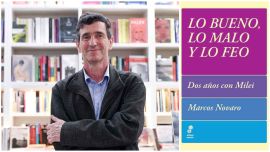

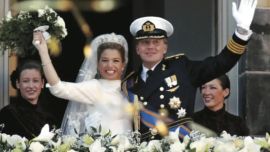

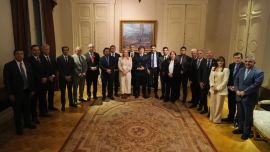
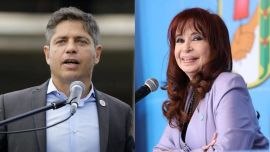
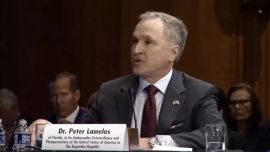

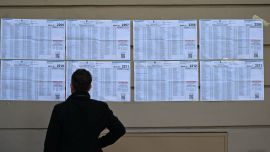
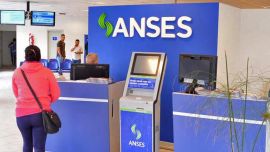
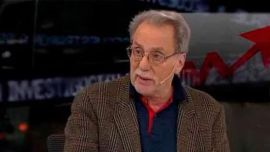
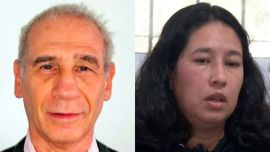

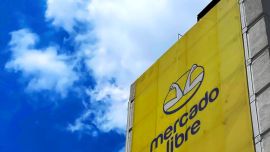
Comments